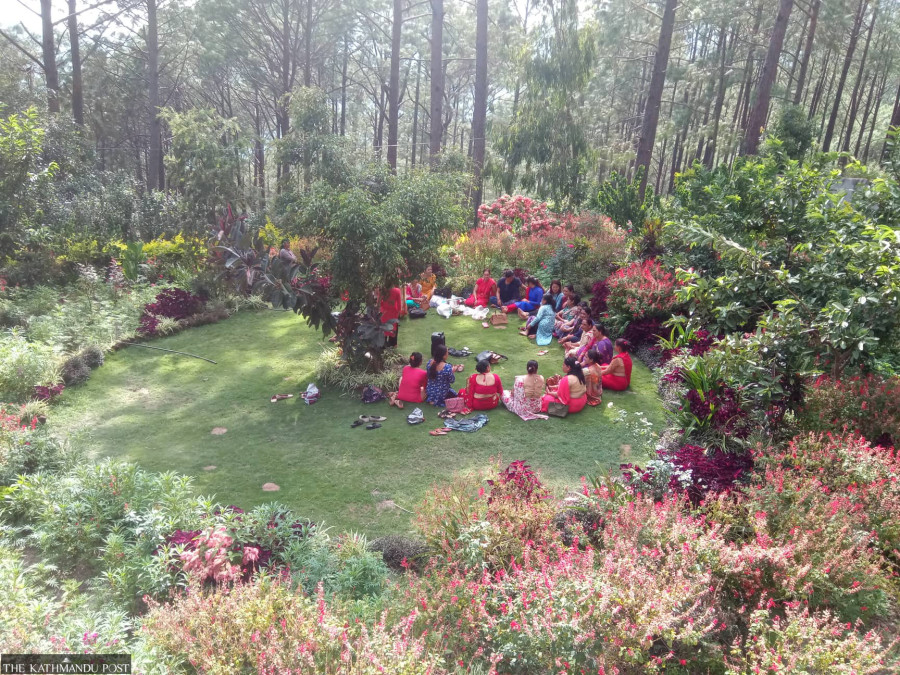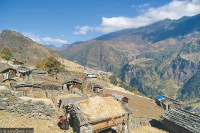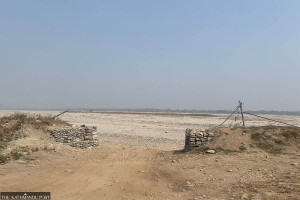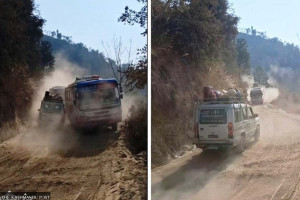Koshi Province
Local units across country turning waste into wealth and wonder
Around 13.5 tonnes of garbage collected daily from Dhankuta Municipality is turned into compost manure by mixing the decayed garbage with soil, which is later used to fertilise a flower garden.
Ramesh Chandra Adhikari
Waste management is a serious issue in most of the city markets in the country. The national capital, Kathmandu, has been struggling to manage solid waste for a long time. However, some local units outside Bagmati Province have not only managed waste efficiently but also been generating income from solid waste.
Dhankuta Municipality has justified that solid waste can be managed systematically and the garbage disposal sites can turn into attractive destinations.
One prime example of how efficiently waste can be utilised is Salleri forest near Dhankuta bazaar. A landfill site of Dhankuta Municipality, Salleri forest resembles a public garden more than a garbage disposal centre. Colourful birds, bees and butterflies can be seen in the beautiful flower garden.
The well-managed landfill site in Dhankuta-6 has 45 different species of flowers with various species of plants thriving in the surrounding area, according to the environment branch of Dhankuta Municipality.
Chief of the environment branch of the municipality Upendra Khanal says that the waste generated by the municipality is being managed with the help of the private sector. According to him, around 13.5 tonnes of garbage collected daily is turned into compost manure by mixing the decayed garbage with soil, which is later used to fertilise the flower garden.
Salleri forest is located near Dhankuta Bazaar, Kachide and Atmara among other dense settlements.
According to Khanal, the flower garden is spread across 0.18 acres out of the 3.77 acre landfill site.
“We plan to expand the garden to another 0.25 acres,” he said. “This initiative has also generated employment for the locals with 39 people currently employed under the project. The private sector employs 14 people and the municipality employs 25 people.”
Kaushal Thapa, coordinator of the Garbage Management Centre, said that garbage segregation begins at the household level. About 60 percent of the items collected as garbage, including iron, glasses, plastics, electrical goods, carton boxes and papers, are sold separately.
“Awareness training was given to 250 people in the urban areas to lead the management of degradable and non-degradable garbage. Most residents are involved in kitchen gardening and terrace gardening so most of them use compost manure from rotting vegetables,” said Thapa.
According to the municipality, the Department of Mines and Geology conducted a feasibility study in 2001. Following the feasibility study and preliminary environmental test of the landfill site, waste management work started in 2008.
Suryodaya Municipality of Ilam, Buddhashanti Municipality of Jhapa, Mahakali Municipality of Darchula and Swargadwari of Pyuthan have also started waste management initiatives along similar lines. Dhankuta was declared a plastic-free city 10 years ago and the government awarded a cash prize of Rs1 million to Dhankuta for being the best clean city.
Tilottama Municipality in Rupandehi district also launched the ‘Green Tilottama, Clean Tilottama’ campaign in March 2020. The municipality, in collaboration with two private companies, has been collecting and managing solid waste for the past two years. Forty-two sanitation workers collect garbage and help clean the municipality.
“The municipality’s campaign has been a huge success due to the participation and cooperation of the local people, ward offices and various settlement development institutions. Development does not mean only building infrastructures like roads, bridges and buildings. Sanitation is also an index of development,” said recently elected mayor Ramkrishna Khand.
Tilottama Municipality has installed trash bins in every chowk to collect solid waste, inculcating the habit of using garbage bins among the locals.
Batabaran Sundar Nepal Pvt Ltd is responsible for managing solid waste from wards 1 to 6.
“We bury solid waste that cannot be reused in an open area near the Tinau stream in Tilottama-5. And the company sells the reusable waste from its segregation centre in Kalikanagar,” said Balabhadra Puri, the managing director of the company.
Similarly, Janasahabhagita Bas Swasthya Sahakari Sanstha manages solid waste from wards 7 to 17 of the municipality.
“We separate the usable solid wastes and sell them. To manage other waste, we have launched a promontory green recovery project that makes compost manure out of garbage. Various machines have been installed. They will come into operation soon,” said Khem Gautam of the institution.
Waling Municipality of Syangja has also been earning money while managing solid waste. The municipality has set up a solid waste recycling centre in Waling-1. Sanitation workers collect garbage in two tractors daily and separate the waste into degradable, non-degradable and glass-related waste.
“The degradable wastes are used to make compost manure while most of the non-degradable wastes are separated and sold for reuse,” said Padam Prasad Pandey, chief of the social development unit of Waling Municipality. According to him, the municipality earned Rs 3 million from solid waste by selling non-biodegradable garbage as scrap to interested parties.
(Sanju Paudel in Lumbini and Pratiksha Kafle in Syangja contributed reporting.)




 9.83°C Kathmandu
9.83°C Kathmandu.jpg)












